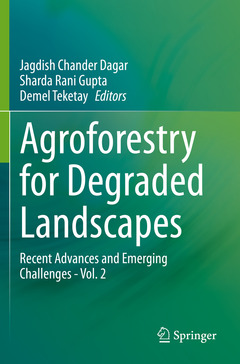Description
Agroforestry for Degraded Landscapes, 1st ed. 2020
Recent Advances and Emerging Challenges - Vol. 2
Language: English
Subjects for Agroforestry for Degraded Landscapes:
Publication date: 01-2022
475 p. · 15.5x23.5 cm · Paperback
Publication date: 01-2021
475 p. · 15.5x23.5 cm · Hardback
Description
/li>Contents
/li>Biography
/li>Comment
/li>
Chapter 1. Biomass Production Potentials under Temperate Agroforestry Systems as Influenced by Selected Sustainability Indicators: A Case Study Approach with Supportive Evidence.- Chapter 2. Management Practices vis-a-vis Agroforestry for the Improvement of Rangelands of Jammu and Kashmir in Northwestern Himalaya, India.- Chapter 3. The Influence of Over-mature, Degraded Nothofagus Forests with Strong Anthropic Disturbance on the Quality of an Andisol and Its Gradual Recovery with Silvopasture in Southwestern South America.- Chapter 4. Assessment of Trees Outside Forests (TOF) with Emphasis on Agroforestry Systems.- Chapter 5. Agroforestry Interventions for Rehabilitating Salt-affected and Waterlogged Marginal Landscapes.- Chapter 6. Silvopasture Options for Enhanced Biological Productivity of Degraded Pasture/Grazing Lands: An Overview.- Chapter 7. Potential of Agroforestry for Rehabilitation of Degraded Ravine Lands.- Chapter 8. Urban and Peri-urban Agroforestry: Utilization of Waste Water and Degraded Landscapes forEnvironmental and Livelihood Security.- Chapter 9. Agroforestry Approach for Rehabilitation of Mine Spoils.- Chapter 10. The Role of Tree Plantations forImproving Soil Fertility and Carbon Sequestration on Coal Mine Spoils.- Chapter 11. Carbon Sequestration Potential of Agroforestry Systems for Rehabilitating Degraded Lands of India.- Chapter 12. Sustainability of Faidherbia albida-based Agroforestry in Crop Production and Maintaining Soil Health.- Chapter 13. Characterization of Faidherbia albida and Prosopis africana Trees Wood Anatomy and Response to Climate Variability Using Dendrochronology in the Sahelian Agroforestry Parklands.- Chapter 14. Lac-based Agroforestry System for Degraded Lands in India.- Chapter 15. The Role of Insects in Enhancing Ecosystem Services of Tree-based Systems on Degraded Lands.- Chapter 16. Promoting Bamboo-based Agroforestry for Enhancing Ecosystem Services from Degraded Lands.- Chapter 17. Agroforestry Developments for Degraded Landscapes: A Synthesis.
Jagdish Chander Dagar, Former Assistant Director General and Emeritus Scientist at ICAR, has long been actively involved in the areas of agroforestry, natural resources management, biosaline agriculture, rehabilitation of degraded lands, ethnobotany, plant ecology, environmental sciences, biodiversity, climate change and sustainable agriculture, as can be seen in his more than 300 research papers, published in peer-reviewed journals, book chapters and conference proceedings. He has been conferred with several awards and honours and is a Fellow of the National Academy of Agricultural Sciences and several other professional societies. He has also been a consultant to the UN, CIMMYT, and Haryana Forest Department. Dr Dagar is also Chief Editor of the Journal Soil Salinity & Water Quality.
S. R. Gupta, former Professor of Botany, Dean of Life Sciences, and Emeritus Fellow of the UGC, is a nationally and internationally recognised ecologist who has taught at theDepartment of Botany and at the Institute of Environmental Studies at Kurukshetra University, India. She has made significant contributions to better understanding the biodiversity and ecosystem functions of grasslands, forest ecosystems, soil biodiversity, ecological rehabilitation of salt-affected soils, carbon sequestration in agroforestry systems, and the sustainability of conservation agricultural systems. The author of 98 research papers published in national and international journals, she is also a Fellow of the National Institute of Ecology and is affiliated with the Institute of Environmental Studies.
Demel Teketay Fanta received his MSc in Plant Taxonomy from Reading University (UK) and PhD in Forest Vegetation Ecology from the Swedish University of Agricultural Sciences. He is currently serving as a Professor of Forest Sciences and founding Dean of the Faculty of Natural Resources at Botswana University of Agriculture and Natural Resources (BUAN). He h




